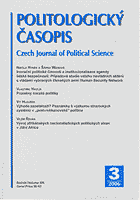Innovative Political Practices and the Institutionalization of Human Security Agenda: A Case Study of the Relationship Between NGOs and the...
Inovační politické činnosti a institucionalizace agendy lidské bezpečnosti: Vztah NGOs s vládami vybraných členských zemí Human Security Network
Author(s): Nikola Hynek, Šárka WaisováSubject(s): Politics / Political Sciences
Published by: Masarykova univerzita nakladatelství
Keywords: Human Security Network; governmentality; global governance; soft power; transnational political community; non-governmental actors; middle power
Summary/Abstract: This analysis deals with innovative political practices that are claimed to have occurred during the materialisation of the human security agenda. Specifically, the article examines the platform known as the Human Security Network (HSN) from a perspective focusing on the relationship between governments of selected HSN members on the one hand, and nongovernmental actors on the other. After distinguishing the governmentality approach (which serves as the theoretical backbone of this piece) from a rather problematic global governance approach, the text focuses attention on the notion of power – its nature and various figurations. The subsequent section introduces the HSN as a new type of transnational political community, tackles the politics of collective identity formation, and finally situates the platform within a wider context of security organizations. What follows is an empirical analysis of selected members of the HSN divided into three clusters, resting on the clarity of their governmental rationality and collective identity.
Journal: Politologický časopis - Czech Journal of Political Science
- Issue Year: XIII/2006
- Issue No: 3
- Page Range: 267-284
- Page Count: 17
- Language: Czech

